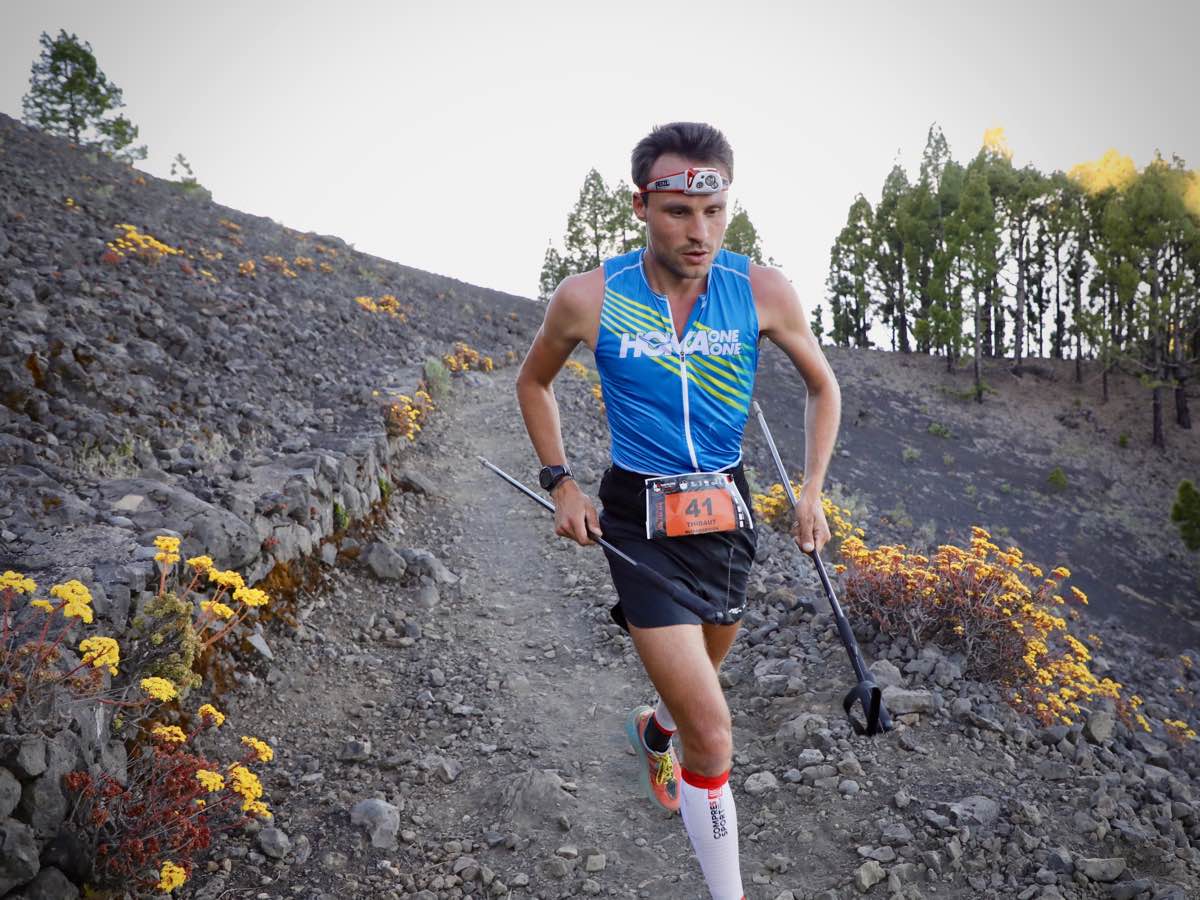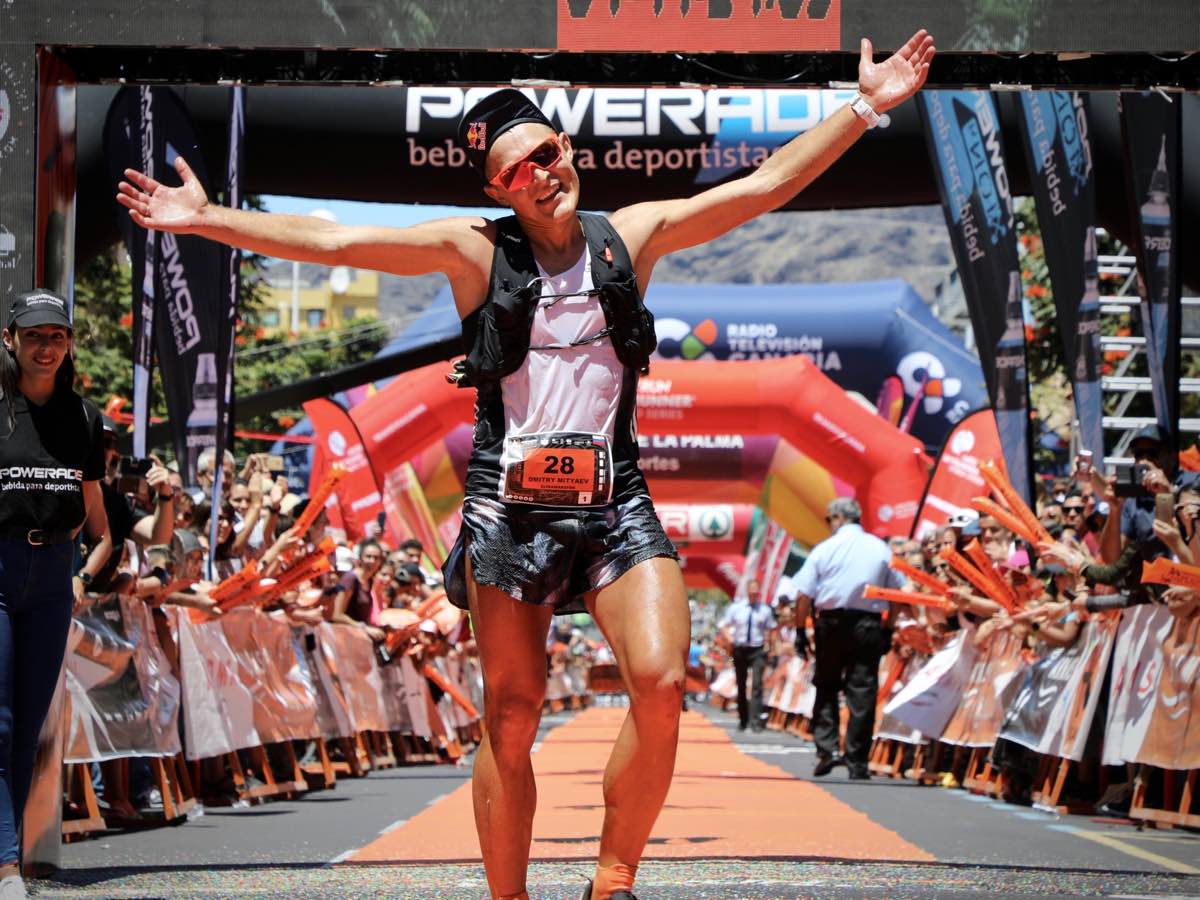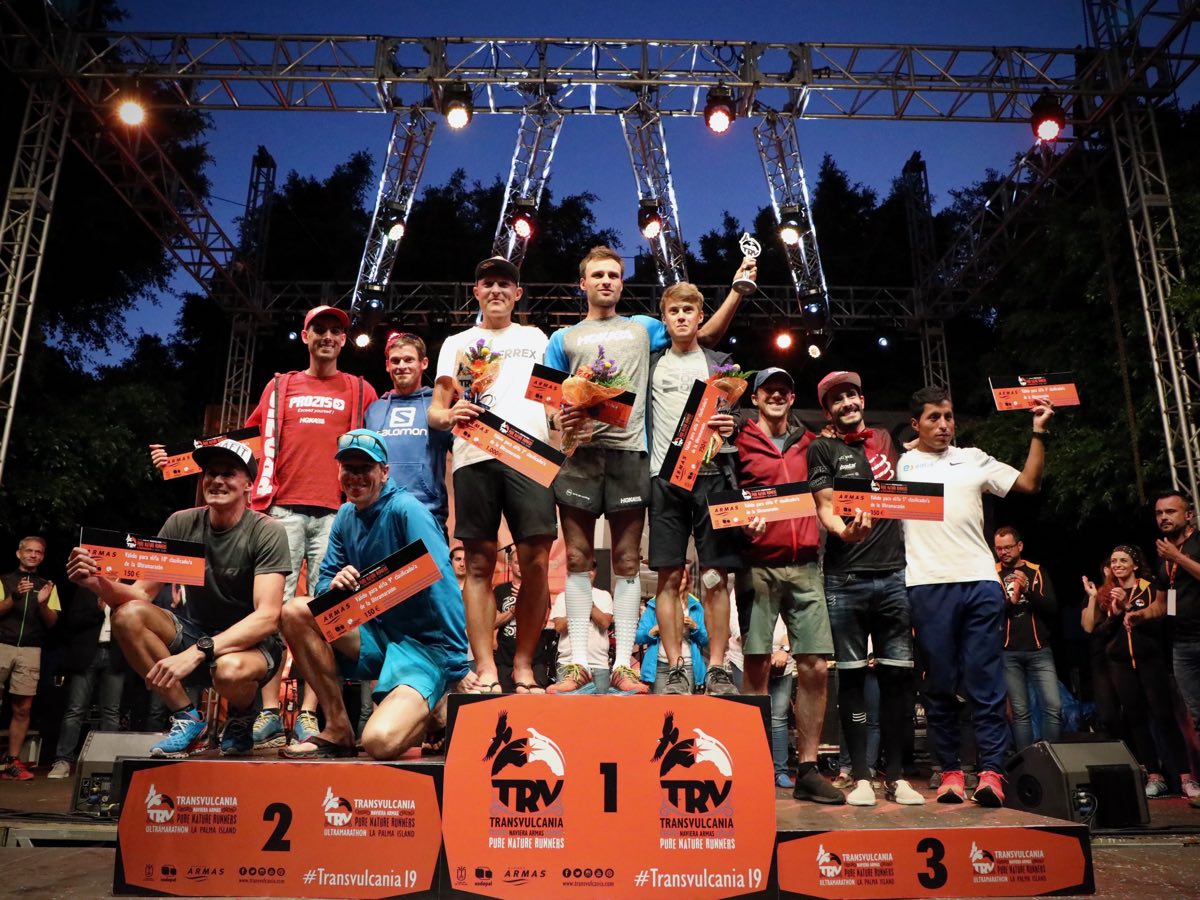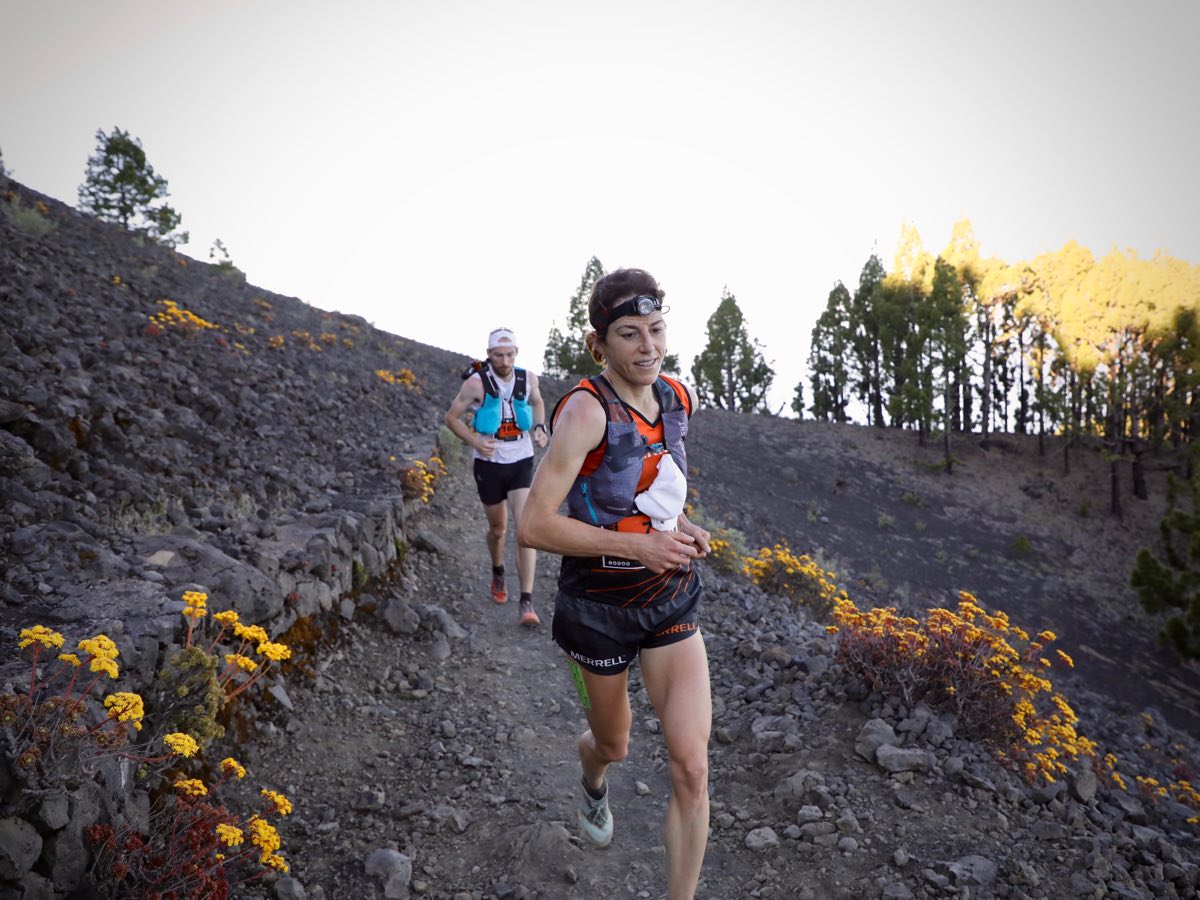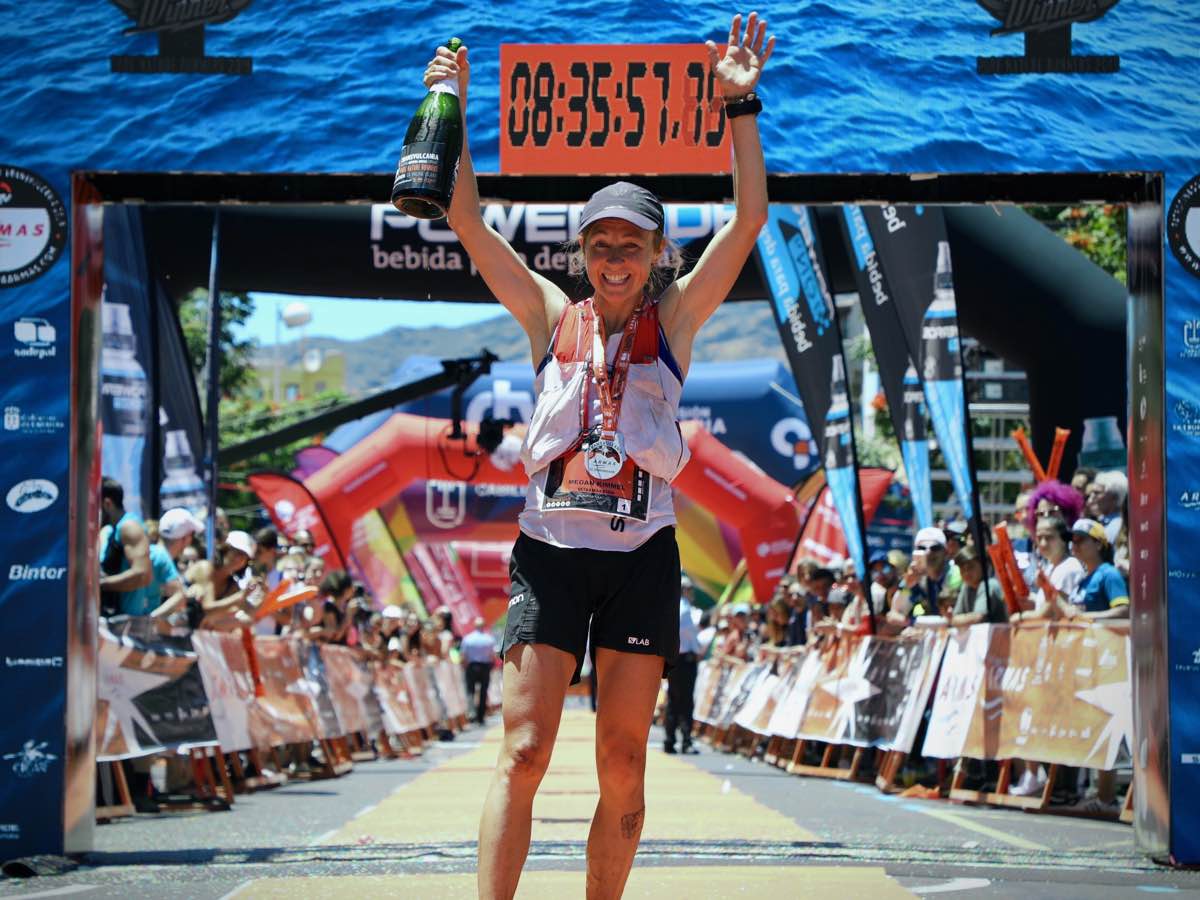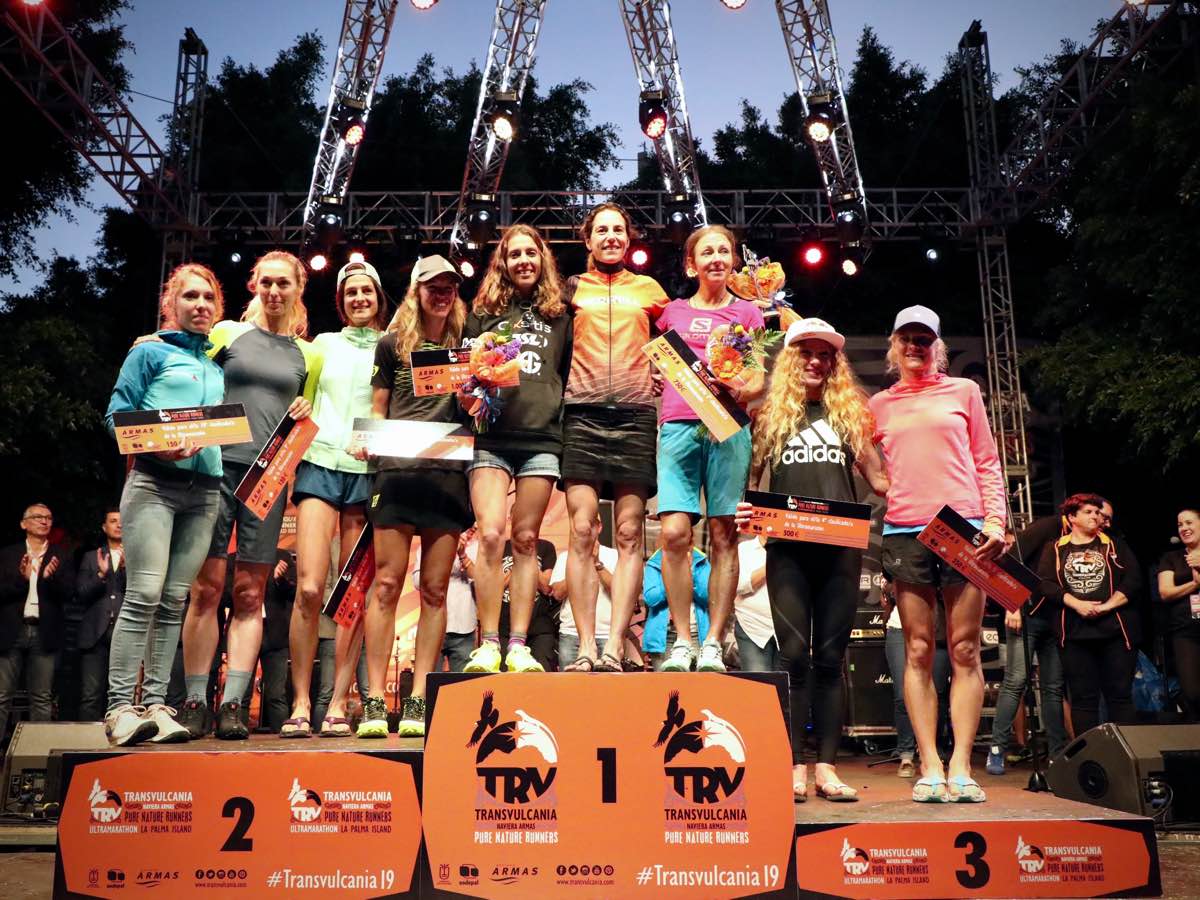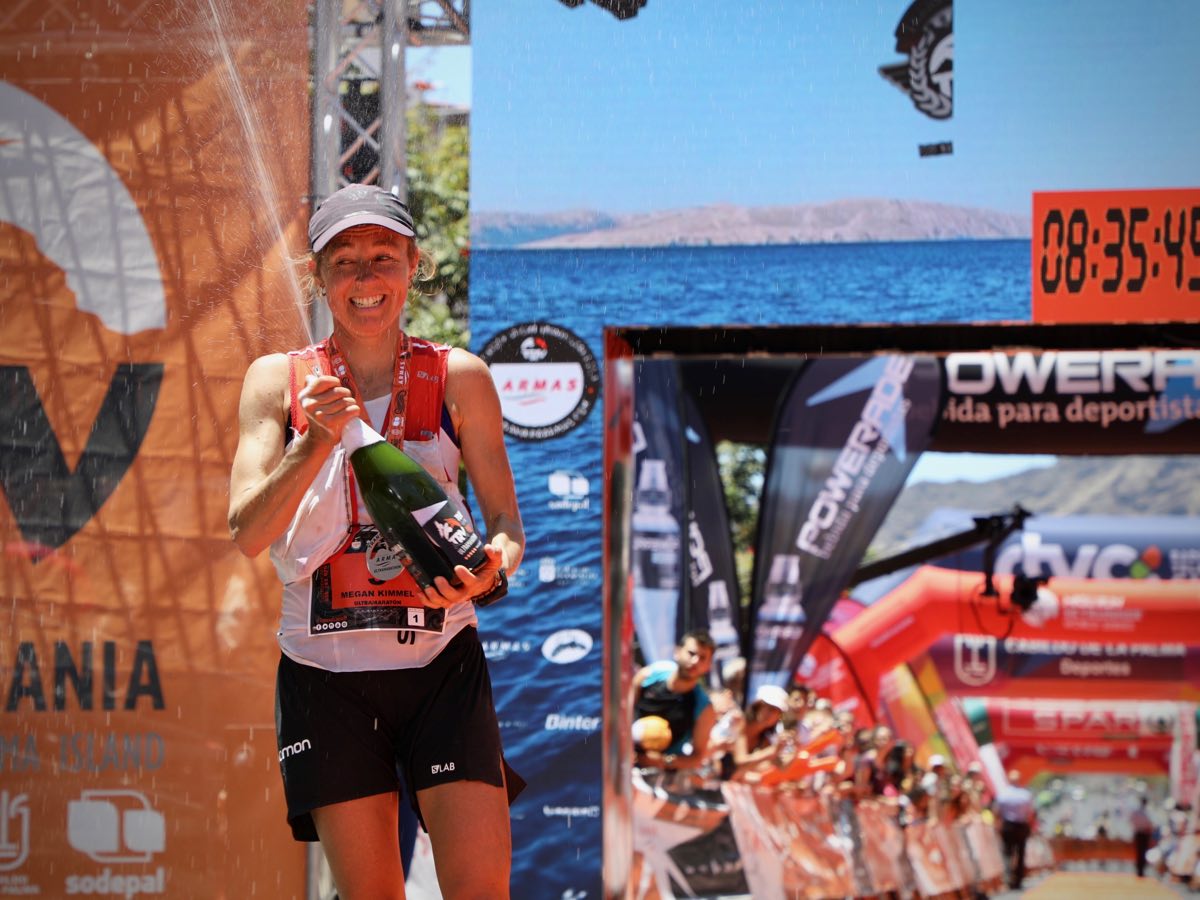 Amongst a challenging course and competitive fields, Ragna Debats (pre-race and post-race interviews), of the Netherlands but living in Spain, and France’s Thibaut Garrivier (post-race interview) won the 2019 Transvulcania Ultramarathon.
Amongst a challenging course and competitive fields, Ragna Debats (pre-race and post-race interviews), of the Netherlands but living in Spain, and France’s Thibaut Garrivier (post-race interview) won the 2019 Transvulcania Ultramarathon.
Before dawn on Saturday morning, May 11, from El Faro de Fuencaliente, the south tip of La Palma island, Transvulcania fired off and runners raced for the sky. By the time the 74.3-kilometer (46 miles) course concluded in the city of Los Llanos on the island’s west side, participants racked up some 4,350 meters (14,280 feet) of climbing. During that distance, they ran through volcanic cinder, over lava rocks, among the island’s famous banana plantations, over the island’s approximately 2,420-meter (7,940 feet) high point, and on the race course’s infamous descent from that high point to sea level.
Both the men’s and women’s races were dynamic courtesy of deep fields, with the men’s race staying volatile until the bottom of that 2,400-meter descent when there was less than 10k left to race. It was there that Thibaut Garrivier finished the downhill faster than the rest of the field and created the few-minute gap which secured him the win. The women’s race stayed similarly tight up and over the race’s high point, though women’s champion Ragna Debats used the long downhill to create a major gap of 15 minutes by 5k to go.
 iRunFar is an independent entity covering the sports of trail running and ultrarunning around the world. If you like what we’re doing, consider becoming a monthly patron on Patreon or making a one-time donation to support our work. Thank you!
iRunFar is an independent entity covering the sports of trail running and ultrarunning around the world. If you like what we’re doing, consider becoming a monthly patron on Patreon or making a one-time donation to support our work. Thank you!
To get all the latest ultra news from iRunFar.com, subscribe via RSS or email.
2019 Transvulcania Ultramarathon Men’s Race
Let’s jump right into it. Sweden’s Petter Engdahl (post-race interview), a Nordic ski racer turned mountain runner, took the race out hot. At 7k into the day, he’d already created a little space between he and the rest of the field, though many men played close chase. This time gap increased to about six minutes around the 40k point. About then, though, two men behind Engdahl began working together to reel him back in.
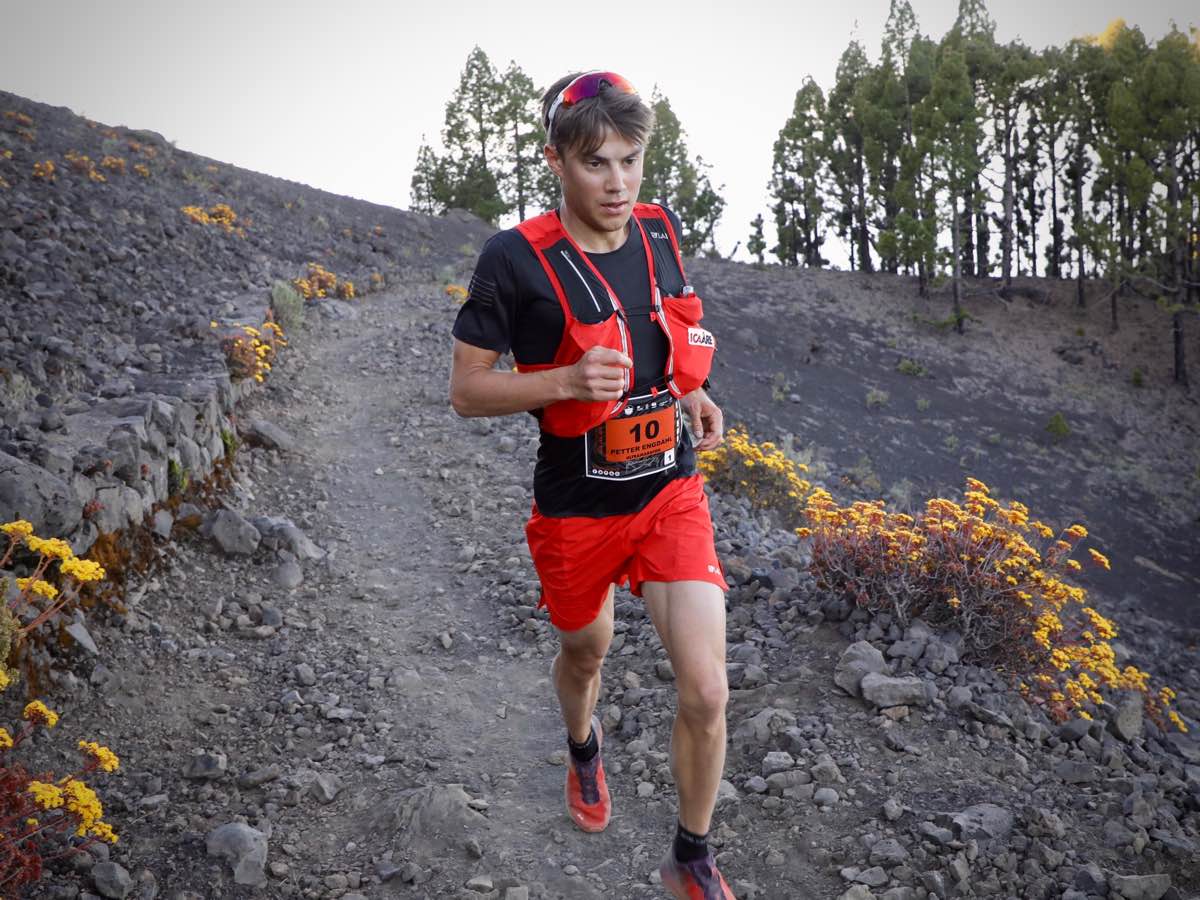
Petter Engdahl leading the race at 22k before continuing on to take third. All photos: iRunFar/Meghan Hicks
Enter France’s Thibaut Garrivier (post-race interview) and Russia’s Dmitry Mityaev (pre-race and post-race interviews). Though earlier in the race, the pair ran among some pace pushers who would eventually drop back and out–such as Italy’s Marco De Gasperi and France’s Sylvain Court–by the halfway point they’d moved into second and third positions. Roughly there, they started working together to reconnect with Engdahl over the race’s highest terrain. As such, the trio arrived to the Roque de los Muchachos aid station at 51k on the island’s high point within a few seconds of the other, Engdahl and Garrivier actually together and Mityaev a few seconds back.
But as is usually the case with this race’s unique 2,400-meter continuous descent, the race really shook out there. Engdahl dropped off the lead group, later saying he experienced some problems on the downhill. He fell hard at one point and it shook his confidence enough that he rolled a bit more conservatively after that. Then, it was a two-man race between Garrivier and Mityaev. Both reported after the race taking hard falls on the descent, too, though Mityaev’s fall caused enough pain that he had to pause for some 40 seconds and he lost contact with Garrivier. Garrivier, on the other hand, continued his strong descent, finishing it with a 3.5-minute lead.
The race doesn’t end when that descent does, though! It’s still about 5k to the finish line, which includes 400 meters of climbing. However, Garrivier held that 3.5-minute gap all the way to the finish line. After taking third last year, Garrivier movef up the the premier position to become the 2019 Transvulcania Ultramarathon champion. While Garrivier has had increasingly strong results in the last few years, this win marks a definitive breakout.
Mityaev crossed the line a few minutes later to take second for the second year in a row. Though Engdahl couldn’t compete for the win, it was no contest between he and the rest of the men’s field for his third-place position, with the next man not rolling over the line for some 15 minutes.
Jonathan Albon (pre-race interview), who lives in Norway and is from the U.K., said after the finish that he suffered the heat but otherwise felt okay in taking fourth. Switzerland’s Diego Pazos finished fifth, completing his double of taking second at the Madeira Island Ultra-Trail just two weekends ago.
Peru’s Remigio Huaman hung in the men’s top 10 all day to ultimately finish sixth. In seventh was the USA’s Max King, who said ahead of the race that he was battling plantar fasciitis. He looked strong and moved well in the race’s uphill and flatter terrain, but ultimately wasn’t able to run the huge, late-race downhill properly due to his foot. Spain’s Manuel Anguita finished eighth, following up on his sixth place here last year. The ninth and 10th positions were filled by Germans via the efforts of Florian Reichert and Hannes Namberger.
Japan’s Ruy Ueda (pre-race interview) was another DNF. He unfortunately got sick a couple days before the race and said by 22k that he was already feeling like he had no energy.
2019 Transvulcania Ultramarathon Men’s Results
- Thibaut Garrivier (Hoka One One) – 7:11:04 (post-race interview)
- Dmitry Mityaev (adidas) – 7:14:23 (pre-race and post-race interviews)
- Petter Engdahl (Salomon) – 7:21:28 (post-race interview)
- Jonathan Albon (GORE Wear) – 7:36:34 (pre-race interview)
- Diego Pazos (Compressport) – 7:41:48
- Remigio Huaman (Nike) – 7:45:27
- Max King (Salomon) – 7:50:24
- Manuel Anguita (Prozis) – 8:02:15
- Florian Reichert (Salomon) – 8:04:10
- Hannes Namberger (Dynafit) – 8:06:48
2019 Transvulcania Ultramarathon Women’s Race
France’s Anne-Lise Rousset Séguret (pre-race interview) set the pace off the starting line. In our pre-race interview, Rousset Séguret said she was confident in her training and preparation, and it showed. There may also have been something to the fact that she had two previous second-place Transvulcania finishes going into this year’s edition. Just like Petter Engdahl in the men’s race, Rousset Séguret had a gap at 7k into the race. But unlike the men’s race, a couple women would not let Rousset Séguret get away from the field on her own.
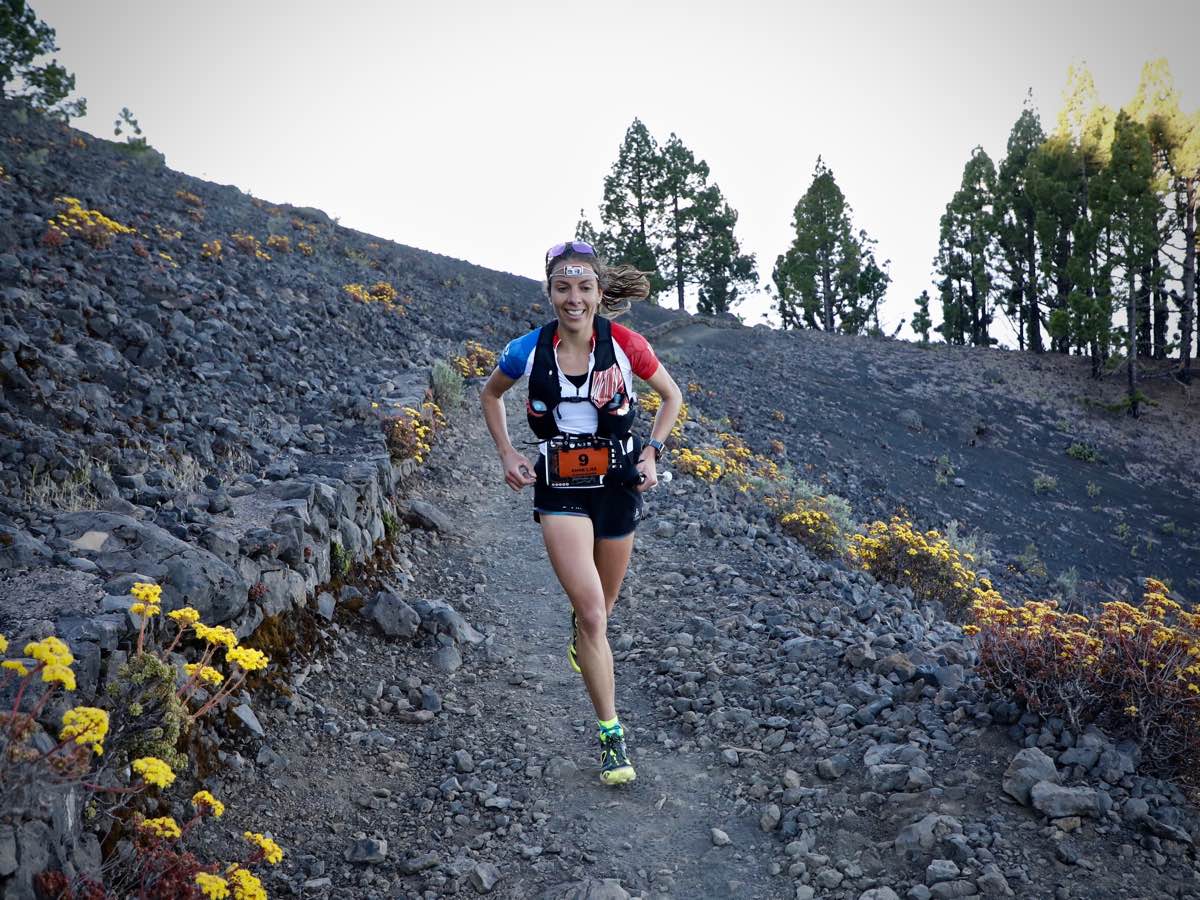
Anne-Lise Rousset Séguret leading the women at 22k. She eventually finished second for the third time at Transvulcania.
So here we add Ragna Debats (pre-race and post-race interviews) and Megan Kimmel (pre-race and post-race interviews) to this story. As the massive, initial climb continued toward the 16k mountain top that’s a focal point of the race’s first half, this trio of ladies were grouped within about a minute of each other. And as a group they were breaking away from the rest of the women’s field. By 16k, third place was more than 10 minutes ahead of fourth and this lead grew to about 18 minutes by 42k. Theirs was such a strong break that, barring anything crazy happening, these women would become the podium. However this is ultrarunning and crazy things happen all the time, which is half of the fun of it.
Eventually, on the gradual uphill terrain between 31k and 42k, Debats made her way into the leadership position. She would say after the race that she felt okay at the start but suffered a physical low around 20k where she tempered her effort. Then, she said she felt better again. By 51k in and over the race’s high point at Roque de los Muchachos, Debats had a five-minute lead. Kimmel rolled over the high point in second, and Rousset Séguret had fallen back to third, another four minutes back of Kimmel. Though she no longer led, Rousset Séguret’s position still seemed safe, as it was more than 20 minutes until the next woman hit the high point after her.
Debats exhibited incredible strength on the 18k-long downhill between 51k and 69k, and tripled the length of her lead in that time. Then, in the tough 5k finish, which involves running up a dry riverbed, making a steep 400-meter climb, and finishing with a couple flat kilometers in Los Llanos, she picked up a few more minutes on all the other women, crossing the line as the 2019 Transvulcania Ultramarathon champion.
Kimmel held onto second place for over half of the descent, but was overtaken by a surging Rousset Séguret in the bottom half. Rousset Séguret arrived to the finish line in second place–for the third time at this race. And Kimmel crossed in third, rounding out the women’s podium. Ultimately, the three-woman early race break stuck.
Until 51k, Russia’s Ekaterina Mityaeva ran in the back half of the women’s top 10, in eighth place for much of the morning. But Mityaeva runs downhills well and she moved up from eighth to fourth on the 2,400-meter, 18k descent, a position she then maintained to the finish. Austria’s Kristin Berglund had a steady day, finishing fifth after running most of the race in the middle positions of the women’s top 10.
Italy’s Elisa Desco took sixth place. From 2010 to 2012, Desco served a two-year ban from the IAAF after she tested positive for EPO at the 2009 World Mountain Running Championships.
Zimbabwe’s Emily Hawgood took seventh; Camille Bruyas, a French citizen from La Réunion, was eighth; Germany’s Eva Sperger was ninth; and Spain’s Maria Zorroza took 10th.
2019 Transvulcania Ultramarathon Women’s Results
- Ragna Debats (Merrell) – 8:09:25 (pre-race and post-race interviews)
- Anne-Lise Rousset Séguret (Team TSL Oxsitis HG) –- 8:25:11 (pre-race interview)
- Megan Kimmel (Salomon) – 8:35:03 (pre-race and post-race interviews)
- Ekaterina Mityaeva (adidas) – 8:53:03
- Kristin Berglund (Salomon) – 8:58:10
- Elisa Desco (Compressport) – 9:00:54
- Emily Hawgood (SCOTT) – 9:01:17
- Camille Bruyas (Salomon) – 9:06:57
- Eva Sperger (GORE Wear) – 9:19:37
- Maria Zorroza – 9:26:44
Coverage Thanks
Thank you to Marissa Harris and Miguelito Rodriguez for their help in covering the Transvulcania Ultramarathon! Our live coverage could not have happened without them.
